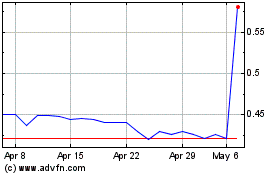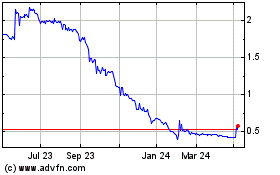Haffner Energy successfully commissioned its hydrogen-from-biomass production unit in Marolles, France – a breakthrough for the hydrogen industry
27 February 2025 - 4:00AM
UK Regulatory
Haffner Energy successfully commissioned its hydrogen-from-biomass
production unit in Marolles, France – a breakthrough for the
hydrogen industry
Vitry-le-François, France – February 26,
2025, 6:00 PM (CEST)
-
Commissioning of the world’s first plant producing hydrogen
from solid biomass at the Marolles site (Champagne region,
France).
-
Unique thermochemical process that significantly
reduces green hydrogen costs.
-
“Super green”1 hydrogen available for
commercial use beginning the second half of 2025.
Haffner Energy (ISIN: FR0014007ND6 – Ticker:
ALHAF) announces the commencement of hydrogen2
production utilizing its proprietary solid biomass thermolysis
technology at its Marolles hydrogen production, testing, and
training center, as was announced in the 12/17/2024 press release.
This unique technology enables the production of renewable hydrogen
at a substantially lower cost compared to conventional methods,
while offering an unparalleled carbon footprint.
“Achieving the continuous production of
competitive green hydrogen is a decisive step. Currently, the
industry faces significant delays due to the excessive cost of
decarbonized hydrogen. We are confident that our solution will
accelerate the adoption of renewable hydrogen and enhance the
sector’s competitiveness. I want to congratulate the Haffner Energy
team and our partners for this remarkable achievement, ushering the
company into a new era,” stated Philippe Haffner, Co-founder
and CEO of Haffner Energy.
A Flexible and Economically Advantageous
Production Model
The site’s production capacity will be
15 kg of hydrogen per hour (kg/h), with an initial
phase temporarily limited to 11 kg/h due to the existing PSA
(Pressure Swing Adsorption) purification equipment. This equipment
will be replaced in the coming months by a PSA designed to reach a
15 kg/h capacity. The unit already produces hydrogen at 8 bar
pressure, ready for commercial distribution starting in the second
half of 2025 to serve transportation and industrial markets.
Anticipated since late 2024, this commissioning
required the site to be connected to the medium-voltage electrical
grid, which was completed earlier this year, followed by the
on-site presence of commissioning engineers focused on the main
equipment suppliers for hydrogen purification.
The biomass thermolysis unit, operational since
June 2024, exceeds the capacity required to produce 15 kg/h
of hydrogen. The new PSA, already received by Haffner
Energy, will be complemented by a compressor reaching 35 bar
pressure, supplying an H14 distribution station provided by
HRS.
Marolles is designed to operate 8,000 hours per
year. As part of this site's operations, 120 metric tons of
mobility-grade hydrogen per year (15 kg/hour) will be produced,
contributing to the decarbonization of mobility and industry. This
is equivalent to 12 million kilometers traveled with hydrogen
vehicles. Approximately 2,400 metric tons of CO₂ per year will be
avoided or captured through hydrogen and biocarbon (char or
biochar) combined.
A memorandum of understanding for the
offtake has been signed for the supply of 90 tonnes of
hydrogen per year, mainly for mobility applications, which is
designed to ensure a commercial outlet within the next few
months.
Hydrogen Production from Residual Solid
Biomass: A Game Changer
The scaling up of Haffner Energy’s proprietary
biomass thermolysis technology is poised to disrupt the
global and French renewable hydrogen markets, facilitating
accelerated commercial and industrial development. This technology
offers several key advantages:
-
Economically Competitive Solution: Already capable of
competing with gray hydrogen for installations of 20 MW
and above – a feat far from achievable by alternative
technologies.
-
Economic Model Based on Low-Cost Biomass Energy:
Hydrogen from biomass thermolysis is significantly cheaper to
produce than hydrogen from the electrolysis of water thanks to low
primary energy costs (<30€/MWh and often even <20€/MWh,
compared with >70€/MWh for decarbonized electricity) and optimal
energy efficiency (generally >70%).
-
Independence from the Electrical Grid: Unlike
electrolysis, thermolysis is minimally dependent on electricity
availability and cost, ensuring stable and predictable
production.
-
Negative Carbon Footprint: This technology
sequesters biogenic carbon through biochar
co-production, achieving a negative carbon footprint when
considering the full LCA.3
-
Flexible Sourcing: This biomass-agnostic
technology is able to utilize various residual biomasses, in
particular from agriculture, ensuring greater autonomy and
resilience against feedstock market fluctuations while
significantly expanding available resources.
Towards Commercial and Industrial
Expansion
The commissioning of the Marolles unit marks a
strategic milestone for Haffner Energy. This success accelerates
commercial discussions with several partners interested in this
disruptive technology and, as announced in previous communications,
will enable the Company's project pipeline to be converted
into firm orders, thereby generating
revenue. In particular, the effective commissioning of the
site is a catalyst for finalizing the signing of two major
contracts.
The continuous operation of hydrogen and
renewable gas production equipment on site will also enable Haffner
Energy’s team to conduct tests using specific biomasses for each
potential client, including non-conventional biomasses such as
organic sludge, manure, and algae, thereby confirming the
compatibility of Haffner Energy’s technology.
Furthermore, Haffner Energy is now positioned
to leverage a previously untapped technological solution
that converts hydrogen into electricity at an extremely competitive
cost, highly valuable during peak consumption periods.
Despite a global context that remains
unfavorable to the development of the hydrogen market, particularly
in Europe and in France—where the national hydrogen strategy has
yet to be announced—Haffner Energy’s position in this
high-potential market is now strengthened.
Additional resources
-
About Marolles : press release and November 2024 media
kit
-
About renewable gas production commissioning in Marolles :
06/20/2024 press release
-
About biomass procurement partnerships : with Bambbco -
09/24/2024 press release; with Hexas- 03/13/2024 press release
Next events
-
Annual results
2024-2025
June 18, 2025
-
Annual Shareholders
Meeting
September 10, 2025
About Haffner Energy
Haffner Energy is a French company providing
solutions for competitive clean fuels production. With a 32- year
experience converting biomass into renewable energies, it has
developed innovative proprietary biomass thermolysis and
gasification technologies to produce renewable gas, hydrogen and
methanol, as well as Sustainable Aviation Fuel (SAF). The company
also contributes to regenerating the planet through the
co-production of biogenic CO2 and biocarbon (or
char/biochar). Haffner Energy is listed on Euronext Growth (ISIN
code : FR0014007ND6 – Ticker : ALHAF).
Investor Relations
investisseurs@haffner-energy.com
Media Relations
Laure BOURDON
laure.bourdon@haffner-energy.com
+33 (0) 7 87 96 35 15
Glossary:
* Biocarbon is a carbon-rich solid material.
Biocarbon contains biogenic carbon absorbed from the atmosphere by
plants via photosynthesis. This characteristic makes it a major
carbon sink when used as a soil amendment, either applied directly
or incorporated into fertilizers (known as biochar), or
incorporated into building materials (known as char). Biocarbon is
also a very dense source of renewable energy (31 MJ/kg) that can be
gasified on site to increase the production of biofuels such as
bio-SAF or the production of renewable hydrogen, but can also be
shipped and gasified at another site, notably for the production of
e-fuels.
1 In accordance with the order of
July 1, 2024 specifying the greenhouse gas emission threshold and
the methodology for qualifying hydrogen as renewable or
low-carbon.
2 Samples were taken today by an
independent laboratory to validate the mobility quality of this
hydrogen.
3 In accordance with the life cycle
assessment study carried out by the LCA consultancy EVEA at the end
of 2021.
- PR_H2production_Marolles_EN_20250226


Haffner Energy (EU:ALHAF)
Historical Stock Chart
From Jan 2025 to Feb 2025

Haffner Energy (EU:ALHAF)
Historical Stock Chart
From Feb 2024 to Feb 2025
